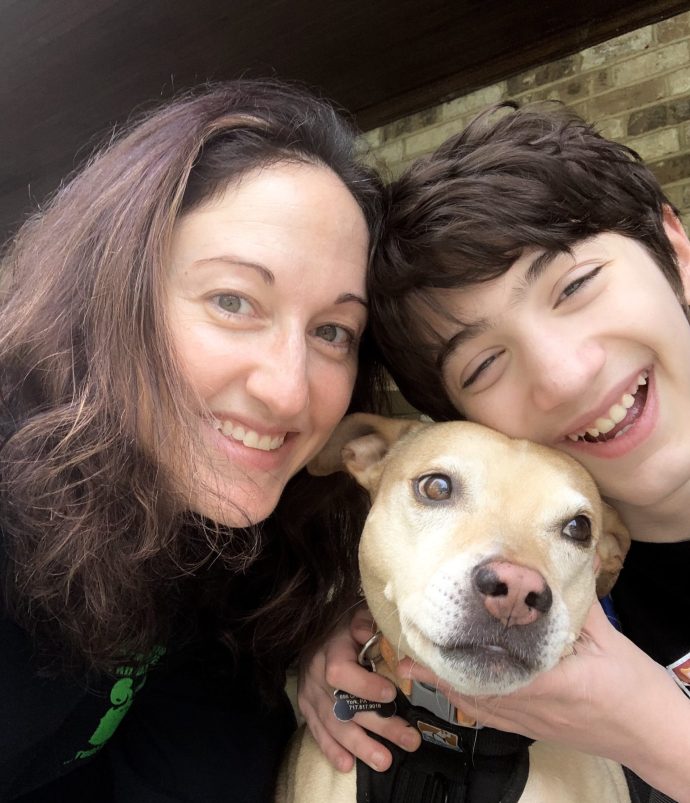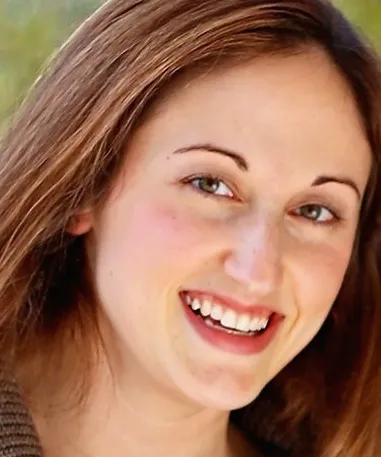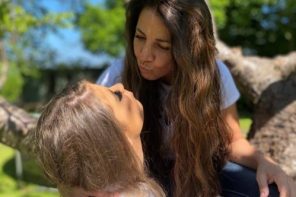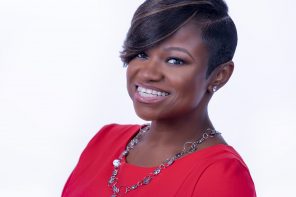Liz Lewis is a compassionate advocate, the Founder of ADHD Enclave, an online community built to enhance and inspire the lives of moms with ADHD, and most importantly, proud CEO of her household. Liz Lewis courageously creates content and provides an online community that empowers mother’s with ADHD. As a mom whose son also has ADHD, Liz’s story inspires resilience in the face of executive functioning obstacles that motherhood requires and proves that we can make small radical shifts that improve our daily lives.
When did you find out you had ADHD and what was your diagnosis experience like?
I was the first one in my middle school diagnosed with ADHD, that wasn’t fabulous. It was early in the ADHD days in ’91, ’92, I was told, ”You have this problem, take these pills every day,” but I didn’t see ADHD as a problem – I didn’t have academic or behavioral issues. Every day, I used to tell my friends I was going to my locker before meeting them in the cafeteria, just to backtrack around to the nurse for Ritalin; I felt very trapped.
I didn’t meet anyone else with ADHD until college, and only then did I share my diagnosis with a couple good friends. When I got out of college, I stopped taking medication because, as is typical with a lot of us, we go through phases where we think we don’t need it. I felt pretty good about how I had managed my ADHD throughout my life.
What led you to reclaim your diagnosis and ultimately to advocating for Mom’s with ADHD?
The turning point was my son and me being miserable and not knowing why. Looking back, my pregnancy was absolutely fine; the high levels of estrogen seemed to balance my neurochemicals a little bit more. But after I had my son, I just wasn’t functioning. My son also has ADHD and is on the spectrum; he was very high-need from the beginning. I quit my job, yet still felt completely overwhelmed and really ashamed that I couldn’t make the best of it. I didn’t know if I was having postpartum depression or what, but knew, “This isn’t right. I should be enjoying my time with my infant and be happy, right? Making dinners, working out at the gym, doing all the things.” Sometimes, I would just sit in my room with the baby screaming, I didn’t even have the energy to let the dog out. My husband would come home and say, “Did you leave the room today?” I was like, “Yeah, kind of.”
I thought that it would pass, that my hormones would settle down, and everything would be okay. As he got bigger, the feeling didn’t let up, I couldn’t take care of the baby and the house. Everything kind of blew up. I had a meltdown. I looked at my personal history and realized I’d been pushing this ADHD thing under the rug for a while.
My family physician, who had prescribed in the past, thought it was postpartum, but I suspected it was ADHD because having a baby requires every executive function you have. I knew that if I faced ADHD head on, maybe I could figure why I was struggling so much as a new mom. I found a psychiatrist, who recommended seeing a therapist first, which I did for a while, but around 2011-2012 I was told, “They’re going to want to retest everything.” So, I just let it go. I knew I had been diagnosed and just started my own research. I spent 2-3 years reading before I got an appointment with a psychiatrist.
I won’t say it was difficult to find information, but it was hard to find my people; to find community. I could find women with ADHD, but not all were moms or in my age group. I kept thinking “I have to meet some other moms with ADHD.” I probably joined 12-15 different Facebook groups to see if it was my vibe, and then moved on. I wanted a website for moms with ADHD, but couldn’t find any. There were a few blogs about ADHD in general, but I decided to get re-diagnosed around 2015 and to write about being a mom with ADHD. I wanted it to be funny and serious, but I wanted to give out real information, so, I built a website in 2015.
I kept writing and I’ve gotten really lucky; I got a decent amount of attention and respect for what I do. People have given me so much support. In January of 2019, I shut down my Facebook group because I moved off of social media and I built a separate platform. Ever since, I have been building out a curated library of information. Some of it by me, some by other people. I basically have a membership, but some meet with me live a couple of times a week and others just like to post to each other in the group.
What are you working on now?
The Enclave – a membership that makes peer coaching and support accessible to everyone. We meet twice a month for small group topical discussions. And every Thursday for Happy Hour. We do a lot of daily check-ins and that sort of thing, and we have guest speakers as well. My partner is Elizabeth Brink. (she is a coach). We also have our app and it is the most fun ever! Just to hang out with a group of women and talk about all the things. My whole focus in life is to create content and community.
I recently signed a contract to write a book for Jessica Kingsley Publishers. It’s a more intersectional view of ADHD women and mothers and because I’m not a clinician it will be different in tone from what’s out there.
What relationship advice do you have for women with ADHD?
Statistically, women with ADHD are more likely to be abused in relationships; whether it’s emotional, physical or just belittling little comments from your partner. I know a lot of mixed relationships with ADHD don’t always end well or there’s a lot of imbalance in relationships. Imbalance of power, respect, etc. I’ve run into a lot of women whose partners treat them really badly and you’ve got to know when you’re being taken advantage of in relationships.
We need to learn to advocate for ourselves better and know when it’s time to exit. Don’t take any crap.
Liz Lewis
If you are early on in your relationship and haven’t had a candid conversation about how ADHD impacts your life, then things are going to be more awkward and difficult later. Ask for what you need. Discuss it early and be honest. We talked about ADHD prior to getting married. He had never spent a lot of time in my place; I very deliberately didn’t invite him. When he helped me move into his house and out of my condo, he saw the mess and we had a conversation about it so he was totally aware. I told him the truth about all of it – the medications I took when I was young and everything. He was so open to asking the questions to understand it.
I think a lot of people hide it or are afraid to ask or to tell the truth. When I need assistance, I’ll say, “I need to do one, two, three, four, five things today. I know it’s not realistic that I’m going to do them all, but I can’t decide which ones are the most important,” and he’ll help me narrow the field. Or I just tell him, “I’m having a meltdown because our kid got in trouble in school today. Can you take the phone call from the school? I can’t do it.”
Ari Tuckman’s research and book about intimacy and sex taught me that a lot of the time, the issues you see, come down to not just distractibility, but transitioning into being intimate with your partner. People just think they’re too tired, that’s not what it is; it’s getting yourself in the right mindset and having enough good feeling managing your ADHD. Let’s face it, untreated, unmanaged, ADHD can put you in a pretty bad mood. We’re very frustrated a lot of the time. That’s not hot or sexy. If you went through your day frazzled, feeling horrible about yourself, at the end of the day, the chances of you wanting to be intimate are going to go down.
Transitioning from not being intimate to being intimate with someone is tough for us; we don’t transition well. Transitioning from doing work, to going into your bedroom and being intimate. That doesn’t mean sex, even just sitting with your partner and having a conversation or something. Couples can drift away from each other because there’s no transitioning, no time for sex, and no good feelings for sex. That becomes an issue in a lot of relationships and that’s something I’m working on. You need some good feelings in place to want to be intimate with someone. Whether that’s setting a schedule or creating a structure in your day, feeling like you accomplished something, your partner likes you, and that house is calm and fine makes that transition in the evening easier.
What do you think is one of your super powers or strengths that comes from having ADHD?
I’m good at making other people feel heard, understood, accepted, and comfortable. People meet me for the first time and say, “Oh gosh, I can’t believe I just told you that personal story.” That seems to be my thing. I definitely have what I call “spidey senses.” When I go into a room I usually sense what’s going on.
If you could go back in time, what advice would you give yourself as a woman embarking on her motherhood journey?
As a larger society, we tend to look at motherhood as this blissful, joyful, perfect state, where your child comes first all the time and you’re totally fulfilled just by having this child or children. It’s really tough on women, especially ADHD women, because of our emotional stuff. There are things in your life you can control and things in your life you cannot. You can’t control your circumstances, eye color, ADHD diagnosis, but you do have some control over your reaction to that. You have to remember that a child is a separate human, you can’t control how they respond to you, your child, your spouse, none of that; really a lot of it is out of your control.
I don’t fit the image that that most people are trying to put out, so I’ve had to let go of certain things: I can’t be the consummate homemaker, I don’t make fancy meals, clean every day, drive around in a giant SUV. I’m the mom who’s getting phone calls from the school two days a week, everyone knows my kid. My house is what it is; I try to make it livable, but I don’t get down on myself anymore just because laundry isn’t folded or because I don’t make a full meal every night. Instead I cook once, eat twice and do that twice in a week.
Have no shame about giving your kids a frozen pizza.
Liz Lewis
All you can do is decide how you’re going to show up in the world, how you’re going to respond what’s going on. Try to make a decision from that angle. Say, “This didn’t go how I expected, how can I best respond to this?” That’s helped me a lot. We are a very imperfect family, but we have a great time.
Can you relate with Liz’s story? Share your comments below!
If you’d like to share your ADHD story with our community, or have any topics you’re interested in learning more about, get in touch!
Liz Lewis is a freelance writer, wife, mother, and the self-appointed CEO of her home. She understands what it is like to navigate life with ADHD as a wife, mother and working professional trying to make it through her day. Learn more about Liz at healthyadhd.com. Follow her on Instagram: @healthyadhd and tune into The HealthyADHD Podcast.





